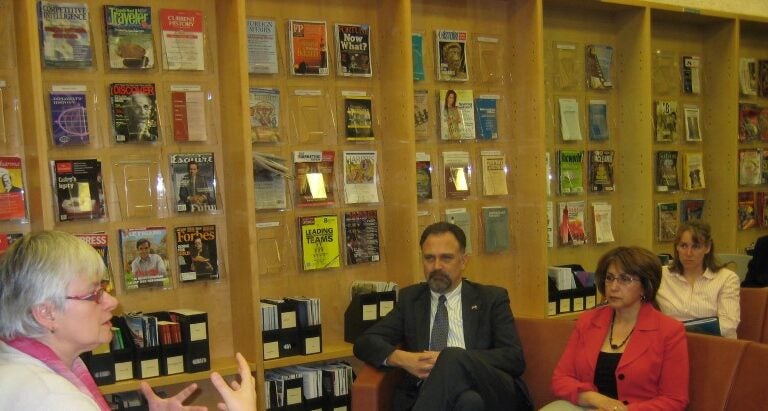American Studies, Dialogue Series, Race & Society
Elzbieta Gozdziak on Child Trafficking into the United States

Elzbieta M. Gozdziak, a prominent scholar of migration issues at the Institute for the Study of International Migration (ISIM) at Georgetown University was invited by CIRS to visit the SFS-Qatar campus.
Gozdziak’s visit aimed to forge research relationships and future collaborations with SFS-Qatar professors working on migration issues. During her time in Doha, she was also a guest speaker at the CIRS Monthly Dialogue Series. Gozdziak is the Director of Research at ISIM and editor of International Migration, a peer reviewed, scholarly journal devoted to research and policy analysis of contemporary issues affecting international migration.
The Monthly Dialogue took place on March 2, 2008 at the SFS-Qatar library. Gozdziak’s lecture was entitled “Victims No Longer: Challenges, Dilemmas, and Opportunities in Studying Trafficked Children” and focused on issues of child trafficking and abuse. Gozdziak outlined the parameters of a comprehensive research project which examines the situations of trafficked children. The study examines the trauma experienced by many children who are lured away from their families and homes, often under false pretenses and with the promise of travel to better environs. The study also analyzes the challenges that service providers face in assisting the children, and assesses prospects for rehabilitation and integration of the children into society. During the lecture, Gozdziak presented key findings from the study and discussed the methodological and conceptual challenges involved in research with trafficked children.
Gozdziak emphasized the need for in-depth academic research concerning the trafficking of children because, she said, “there is much general writing on the subject but little that yields sufficient results that aid in explaining or easing the situation.” Solutions towards rehabilitation and prevention can only happen if governmental policy-making is informed by in-depth and concerned research. Gozdziak told the gathered audience of the difficulties of conducting research on such sensitive and clandestine affairs as the trafficking of children and gaining access to them. She reported that the originally intended year-long study, lengthened to become a two-year endeavor, as the researchers were faced with a variety of challenges concerning approvals, permissions, and grants that needed to be secured before the research project could begin. Thus the dynamics at work are difficult for any research on the subject to fully comprehend and analyze the situation.
Because of the illegality of trafficking, the children can usually only be addressed after they have been freed from their ordeals. Therefore, the research revolves around the rehabilitation process of the children. In these rehabilitation centers the children are considered to be “victims” and so there is even greater challenge in trying to gain permission to study such “vulnerable” populations. Gozdziak insisted, however, that in order to treat trafficked children as beings beyond that of victims, they must not be considered helpless. Instead, they must be allowed and encouraged to have their own sense of self-identity and their own agency.
Self-identity is an important component of rehabilitation as every child’s trafficking situation is different. It is true that some children are neglected and abused in the worst possible ways. At the same time, however, there are many others who do not consider themselves to be victims and were merely fulfilling a cultural and familial obligation, often by working at young ages to support their families. This is why critical and informed research into the subject is important, as not all children should be considered to be in the same predicament. The research should aid in distinguishing each child’s individual needs.
The process of rehabilitation from this point of view should be one that focuses on the children’s sense of empowerment and treats them through cultural relativity as individuals rather than relying on a standardized and homogeneous, and Westernized, ideal of what it means to be child.
Summary prepared by Suzi Mirgani, CIRS staff member.